Iraq Kurds Invade Turkey, Kill 17 (Updated)
An audacious cross-border ambush by Kurdish rebels based in northern Iraq killed at least 17 Turkish soldiers Sunday, ratcheting up pressure on the Turkish government to launch a military offensive into Iraq.
[…]
The raid on Turkish soldiers, among the deadliest attacks in recent memory, was carried out by the Kurdistan Workers’ Party, known by its Kurdish initials PKK. The armed group aims to create an independent Kurdish state out of parts of eastern Turkey, northern Iraq and western Iran. Turkish officials said 16 soldiers were also wounded in the fighting in Hakkari province, which borders Iraq. Thirty-two Kurdish fighters were killed in subsequent clashes and 10 Turkish troops were still missing, they said.
Abdul Rahman al-Chaderchi, a PKK spokesman, said the Kurdish fighters attacked because Turkish troops were conducting war games late Saturday near the border. He said that the death toll was higher than Turkey reported and that several soldiers were being held prisoner, but he declined to provide precise numbers. “They tried to enter the Iraqi lands,” Chaderchi said. “But our fighters have confronted them.”
Senior Turkish military and government officials held emergency meetings Sunday night to decide on a response. Turkey’s parliament voted last week to give Prime Minister Recep Tayyip Erdogan’s government authority for a military offensive into northern Iraq to pursue Kurdish fighters hiding there. “Turkey does not have designs on Iraq’s territory,” Turkish President Abdullah Gul said after the attacks, according to the Anatolian news agency. “However, if Iraq keeps harboring terrorists, Turkey has the right to destroy this.”
At a news conference hours after the ambush, Iraqi President Jalal Talabani, who is Kurdish, ordered the guerrilla fighters to stop their attacks or leave Iraq. “We are against all the actions that are done by the PKK,” he said. “And we will not support the PKK. We want the best relations with Turkey.” But he added: “The Turkish army with all its capabilities couldn’t arrest the leaders of the PKK. So how could we do that? It’s a dream that cannot be reached.”
The immediate crisis is what seems to be an inevitable Turkish raid into Northern Iraq. Given that Talabani has admitted that he’s powerless to control his own territory, I don’t see how Erdogan can hold off demands for action. This, of course, will further complicate the Iraqi situation, perhaps unsettling the one part of the country that has been more-or-less stable since Saddam’s regime was toppled.
The other interesting issue is that yesterday’s raid theoretically triggers Article 5 of the NATO Charter:
The Parties agree that an armed attack against one or more of them in Europe or North America shall be considered an attack against them all and consequently they agree that, if such an armed attack occurs, each of them, in exercise of the right of individual or collective self-defence recognised by Article 51 of the Charter of the United Nations, will assist the Party or Parties so attacked by taking forthwith, individually and in concert with the other Parties, such action as it deems necessary, including the use of armed force, to restore and maintain the security of the North Atlantic area.
Article 6 clarifies:
For the purpose of Article 5, an armed attack on one or more of the Parties is deemed to include an armed attack:
* on the territory of any of the Parties in Europe or North America, on the Algerian Departments of France (2), [on the territory of Turkey]* or on the islands under the jurisdiction of any of the Parties in the North Atlantic area north of the Tropic of Cancer;;
* on the forces, vessels, or aircraft of any of the Parties, when in or over these territories or any other area in Europe in which occupation forces of any of the Parties were stationed on the date when the Treaty entered into force or the Mediterranean Sea or the North Atlantic area north of the Tropic of Cancer.
It’s highly unlikely that Turkey will ask for NATO assistance in this matter, much less that others will answer but the attack is certainly grounds for invoking the mutual defense pact.
Update (Dave Schuler)
There is a timely interview with Iraqi President Jalal Talabani, coincidentally the hereditary leader of one of the two most powerful Iraqi Kurdish factions, in Asharq Alawsat:
(Asharq Al-Awsat) The Turkish Government wants you to arrest their leaders who are present on Iraqi territory.
(Talabani) We cannot do that. How can we arrest the leaders who are present in the mountains and surrounded by thousands of men? The Turkish army, with all its power, cannot do that. How can we do it?
(Asharq Al-Awsat) What, then, does Nuri al-Maliki mean by his comment about eradicating their bases?
(Talabani) I do not think that this is accurate talk. The prime minister and I have the same view, namely, that we cannot send sufficient Iraqi forces to fight the PKK.
*UPDATE (James Joyner) Anderson correctly notes that the Charter was amended with the accession of Turkey to clear up any confusion resulting from the fact that Turkey’s territory overlaps the European and Asian continents. I’ve put in the amended text in brackets in the original post.

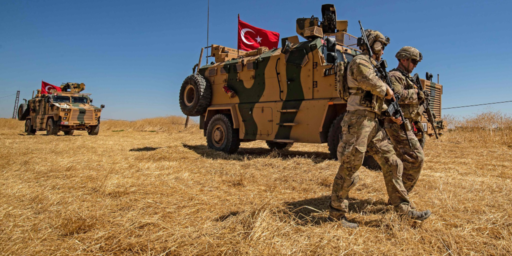
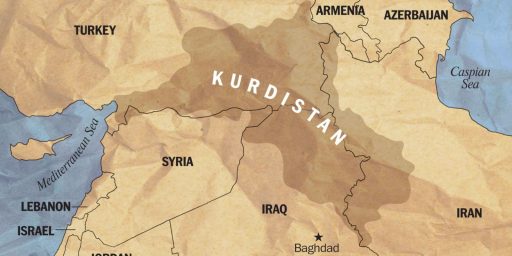
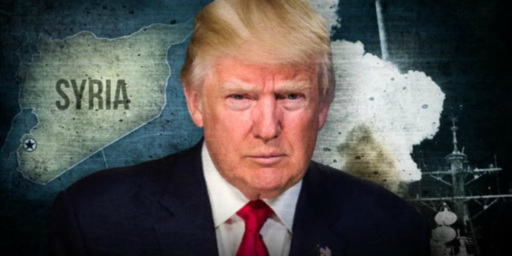
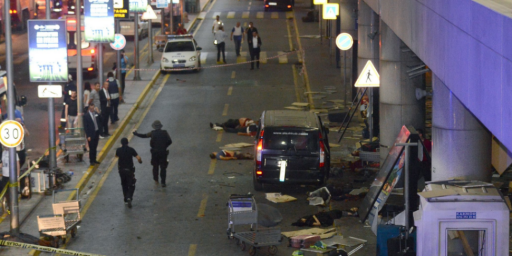
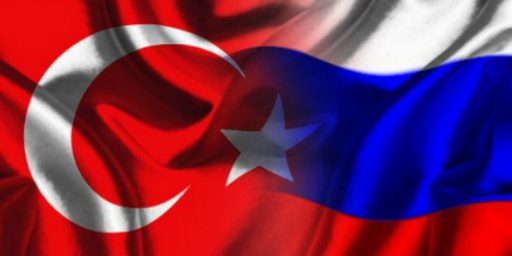
The attack was on the Asian part of Turkey, not its European territory, so theoretically Article 5 doesn’t apply, unless there are additional caveats elsewhere in the charter.
The PKK is instigating a Turkish overreaction, luring the Turks into a sustained guerrilla war like the one in Iraq and Lebanon in which hit and run tactics on friendly turf overwhelms a conventional army. I think the only way for us to prevent the Turks from going in is to put our soldiers (or NATO, or UN) in as a buffer. Given the state of our forces, we don’t have any extra to offer. Maybe our allies might.
An interesting point. Turkey wasn’t an original Member, so clearly that caveat wasn’t considered. Presumably, the wording simply allows NATO to opt out of colonial wars. An attack on a Member state itself, however, would be difficult to exclude.
If that part of Turkey is primarily Kurdish, what are the arguments (other than that Turkey is an important country) for not supporting the creation of a Kurdish state that includes “Iraqi” Kurdistan? Why does Turkey want it, is there oil?
It’s highly unlikely that Turkey will ask for NATO assistance in this matter, much less that others will answer but the attack is certainly grounds for invoking the mutual defense pact.
That reading would mean that, unlike every other NATO member, Turkey has no redress for attacks on a substantial part of its territory. (The only other application that comes to mind would be an attack on Hawaii, but that’s much less substantial a part of the U.S.)
However, if you click the footnote, you’ll see that the language was modified when Turkey joined, to cover an attack
on the territory of any of the Parties in Europe or North America, on the Algerian Departments of France, on the territory of Turkey or on the islands under the jurisdiction of any of the Parties in the North Atlantic area north of the Tropic of Cancer
If Turkey *did* apply — and I am inclined to think they should — then the allies would have to either respond, or send a message to the smaller allies that attacks on them don’t matter much when it’s in the U.S. interest to ignore said attacks.
Given the looming presence of neo-tsarist Russia, I’d imagine that would cause the price of NATO shares to tumble, so to speak.
Paul, arguments pro and con a Kurdistan have been made since the fall of the Ottomans. And yes, Iraqi Kurdistan is where about half of Iraq’s oil is to be found.
I tend to agree. The Membership might be inclined to argue that a small border incursion by a terrorist-guerrilla element doesn’t warrant a group response, especially if WWIII is a foreseeable outcome. But, yes, I think Turkey has every right to bring this before the Council.
Comment in violation of site policies deleted.
The current problems between Turkey and the Kurds was predicted by the Turkish Government, the European Union, and the Arab Nations pre-invasion of Iraq.
In fact Dick Cheney in a 1994 interview predicted not only the possibility of a war between the Kurds, and the Turks, but also the war between Sunni, and Shiite if we invaded Iraq. It would become a “quagmire”, he said with Iraq desintegrating into regions controlled by Shiite, Sunni, and Kurd “strong man”.
It is troubling for me to see every pre-war warning become a reality. It is even more troubling to find out that our so called “leaders” knew perfectly well what the outcome of an invasion to Iraq was going to be, and did it anyway. It is for this reason that In my opinion Dick Cheney and George Bush are either traitors to this nation at worst, or the biggest idiots in God’s creation.